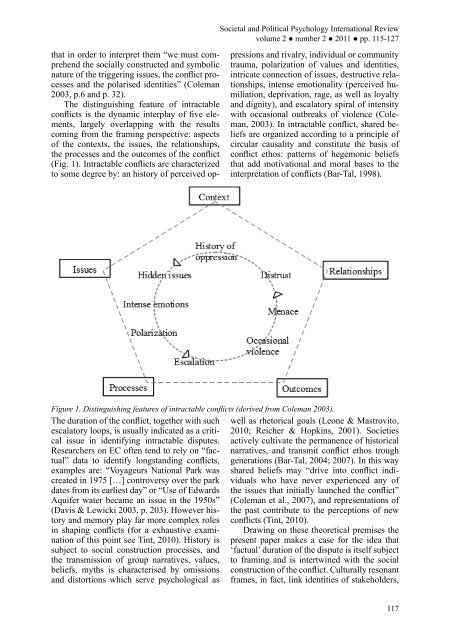State, community, individual - Societal and Political Psychology ...
State, community, individual - Societal and Political Psychology ...
State, community, individual - Societal and Political Psychology ...
You also want an ePaper? Increase the reach of your titles
YUMPU automatically turns print PDFs into web optimized ePapers that Google loves.
that in order to interpret them “we must comprehend<br />
the socially constructed <strong>and</strong> symbolic<br />
nature of the triggering issues, the confl ict processes<br />
<strong>and</strong> the polarised identities” (Coleman<br />
2003, p.6 <strong>and</strong> p. 32).<br />
The distinguishing feature of intractable<br />
confl icts is the dynamic interplay of fi ve elements,<br />
largely overlapping with the results<br />
coming from the framing perspective: aspects<br />
of the contexts, the issues, the relationships,<br />
the processes <strong>and</strong> the outcomes of the confl ict<br />
(Fig. 1). Intractable confl icts are characterized<br />
to some degree by: an history of perceived op-<br />
The duration of the confl ict, together with such<br />
escalatory loops, is usually indicated as a critical<br />
issue in identifying intractable disputes.<br />
Researchers on EC often tend to rely on “factual”<br />
data to identify longst<strong>and</strong>ing confl icts,<br />
examples are: “Voyageurs National Park was<br />
created in 1975 […] controversy over the park<br />
dates from its earliest day” or “Use of Edwards<br />
Aquifer water became an issue in the 1950s”<br />
(Davis & Lewicki 2003, p. 203). However history<br />
<strong>and</strong> memory play far more complex roles<br />
in shaping confl icts (for a exhaustive examination<br />
of this point see Tint, 2010). History is<br />
subject to social construction processes, <strong>and</strong><br />
the transmission of group narratives, values,<br />
beliefs, myths is characterised by omissions<br />
<strong>and</strong> distortions which serve psychological as<br />
<strong>Societal</strong> <strong>and</strong> <strong>Political</strong> <strong>Psychology</strong> International Review<br />
volume 2 ● number 2 ● 2011 ● pp. 115-127<br />
pressions <strong>and</strong> rivalry, <strong>individual</strong> or <strong>community</strong><br />
trauma, polarization of values <strong>and</strong> identities,<br />
intricate connection of issues, destructive relationships,<br />
intense emotionality (perceived humiliation,<br />
deprivation, rage, as well as loyalty<br />
<strong>and</strong> dignity), <strong>and</strong> escalatory spiral of intensity<br />
with occasional outbreaks of violence (Coleman,<br />
2003). In intractable confl ict, shared beliefs<br />
are organized according to a principle of<br />
circular causality <strong>and</strong> constitute the basis of<br />
confl ict ethos: patterns of hegemonic beliefs<br />
that add motivational <strong>and</strong> moral bases to the<br />
interpretation of confl icts (Bar-Tal, 1998).<br />
Figure 1. Distinguishing features of intractable confl icts (derived from Coleman 2003).<br />
well as rhetorical goals (Leone & Mastrovito,<br />
2010; Reicher & Hopkins, 2001). Societies<br />
actively cultivate the permanence of historical<br />
narratives, <strong>and</strong> transmit confl ict ethos trough<br />
generations (Bar-Tal, 2004; 2007). In this way<br />
shared beliefs may “drive into confl ict <strong>individual</strong>s<br />
who have never experienced any of<br />
the issues that initially launched the confl ict”<br />
(Coleman et al., 2007), <strong>and</strong> representations of<br />
the past contribute to the perceptions of new<br />
conflicts (Tint, 2010).<br />
Drawing on these theoretical premises the<br />
present paper makes a case for the idea that<br />
‘factual’ duration of the dispute is itself subject<br />
to framing <strong>and</strong> is intertwined with the social<br />
construction of the confl ict. Culturally resonant<br />
frames, in fact, link identities of stakeholders,<br />
117


